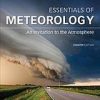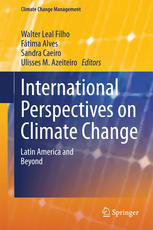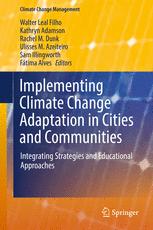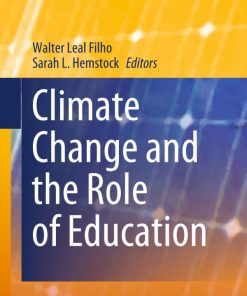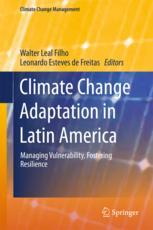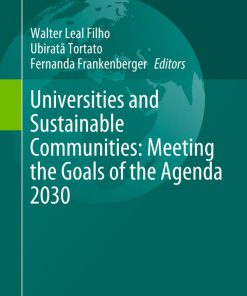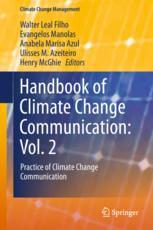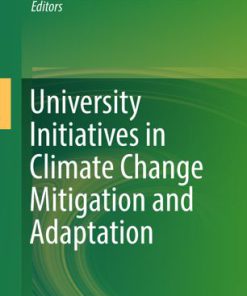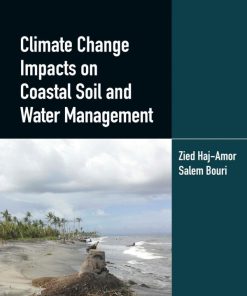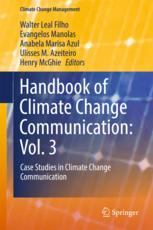Climate Change Impacts and Adaptation Strategies for Coastal Communities 1st Edition by Walter Leal Filho 3319707027 9783319707020
$50.00 Original price was: $50.00.$25.00Current price is: $25.00.
Climate Change Impacts and Adaptation Strategies for Coastal Communities 1st Edition by Walter Leal Filho- Ebook PDF Instant Download/Delivery:3319707027,9783319707020
Full download Climate Change Impacts and Adaptation Strategies for Coastal Communities 1st Edition after payment

Product details:
ISBN 10:3319707027
ISBN 13:9783319707020
Author:Walter Leal Filho
This book presents a comprehensive overview of research and projects regarding climate change adaptation in coastal areas, providing government and nongovernment bodies with a sound basis to promote climate change adaptation efforts.According to the 5th Assessment Report by the Intergovernmental Panel on Climate Change (IPCC), coastal zones are highly vulnerable to climate change, and climate-driven impacts may be further exacerbated by other human-induced pressures.
Apart from sea-level rise, which poses a threat to both human well-being and property, extreme events such as cyclones and storm surges lead not only to significant damage to property and infrastructure, but also to salt water intrusion, groundwater salinisation, and intensified soil erosion, among many other problems. There are also numerous negative impacts on the natural environment and biodiversity, including damage to important wetlands and habitats that safeguard the overall ecological balance, and consequently the provision of ecosystem services and goods on which the livelihoods of millions of people depend. As such, there is a need for a better understanding of how climate change affects coastal areas and communities, and for the identification of processes, methods and tools that can help the countries and communities in coastal areas to adapt and become more resilient.
It is against this background that this book has been produced. It includes papers written by scholars, social movements, practitioners and members of governmental agencies, pursuing research and/or executing climate change projects in coastal areas and working with coastal communities. Focusing on “managing climate change in coastal regions”, it showcases valuable lessons learned from research and field projects and presents best practices to foster climate change adaptation in coastal areas and communities, which can be implemented elsewhere.
Climate Change Impacts and Adaptation Strategies for Coastal Communities 1st Table of contents:
1 “We’re not Refugees, We’ll Stay Here Until We Die!”—Climate Change Adaptation and Migrat
Abstract
Introduction: Geographic, Demographic and Climate Change Issues
Rationale for and Intended Contribution of This Research
Research Design, Methodology, and Data Collection
Data Analytical Strategy
Results and Key Findings
Discussion of Core Issues: “We’re not Refugees”
Research Limitations and Opportunities for Future Research
Conclusion
Acknowledgements
References
2 Sustainable Small-scale Mariculture Ventures as a Comparative Climate Friendly Livelihood Alternat
Abstract
Introduction
Methods
Sponge Farming
Coral Farming
Giant Clams
Limitations
Results
Income and Time Commitment
Socioeconomic Data
Discussion
Best Practices
Conclusions and Future Prospects
Acknowledgements
References
3 Planning and Urban Informality—Addressing Inclusiveness for Climate Resilience in the Pacific
Abstract
Problem
Purpose
Method
Extent and Nature of Urbanization in the Pacific Island Region
Increasing Vulnerability, Location Priorities and Planning Responses
Entry Points for Breaking the Cycle of Deterioration
Approaches for Addressing Urban Informality
Better Understanding of Location Specific Climate Risk
Smarter Use of Spatial Planning Instruments to Guide Land Development
Address Administrative and Regulatory Bottlenecks in Accessing Land
Promote the Use of Prescriptive not Proscriptive Development Consent Approaches
Promote ‘Making-Room on Safe Lands’ Urban Planning Rather Than ‘Containment’ Planning
Involuntary Retreat and Relocation Should only be Used as a Last Resort
Conclusion
Reference
4 At the Frontline of Climate Change: Adaptation, Limitations and Way Forward for the South Pacific
Abstract
Introduction
Methodology
Results/Discussion
Climate Change Capacity-Building, Awareness and Training
Water Resource Management
Disaster Risk Reduction
Coastal Zone Management and Climate Change Induced Relocation
Food Security and Agriculture
Limitations
Recommendations and Way Forward
Conclusion
References
5 Enhancing Adaptive Capacity and Climate Change Resilience of Coastal Communities in Yap
Abstract
Introduction
Yap’s Geography
High Islands of Weathered Volcanic Breccia and Metamorphic Rocks—Yap Proper
High Limestone Island
Atolls and Reef Islands
Climate Variability and Change in the Western Tropical Pacific
Vulnerability of Yap’s Coasts and Coastal Agriculture
Migration as an Adaptation Strategy
The Climate Adaptive Agriculture and Resilience (CAAR) Project
Soil Management
Water Conservation and Management
Livelihood Enhancement
Discussion
Outcomes and Challenges
Conclusion
Future Prospects
Acknowledgements
References
6 Capacity Development and TVET: Accredited Qualifications for Improving Resilience of Coastal Commu
Abstract
Introduction
TVET and Development
Qualification Frameworks
Qualifications and Quality Assurance
The Pacific Regional Federation for Resilience Professionals (PRFRP)
EU PacTVET Project
Context
Certificate 1 in Climate Change and Disaster Risk Reduction—Overview
CCDRR: A Mechanism to Address Climate Change Impacts for Coastal Communities in Vanuatu
Vanuatu Quality Assurance Framework (VQAF)
Conclusion
References
7 An Evaluation of Climate Change Effects on Fishermen and Adaption Strategies in Central Region, Gh
Abstract
Introduction
Study Objectives
Method
Results and Discussion
Background Characteristics of Respondents
Effect of Climate Change on Fishing and Fishermen
Adaptation Strategies Adopted by the Fishermen
Challenges in Adapting to Climate Change Effects
Conclusion
References
8 Retreat or Rebuild: Exploring Geographic Retreat in Humanitarian Practices in Coastal Communities
Abstract
Introduction
Methodology
Relocation as an Imperfect Substitution
Superimposing Humanitarian Institutions
Case Studies: Japan and the Philippines
Conclusions
References
9 “God and Tonga Are My Inheritance!”—Climate Change Impact on Perceived Spritiuality, Adaptat
Abstract
Introduction
Methods
Methodology
Data Analysis Strategy
Study Limitations
Results
Quantitative Analysis and Results
Qualitative Analysis and Results
Themes that Emerged in Interviews and FGD
Discussion
Perceived Impact of Climate Change on Spirituality and Spiritual Adaptation for Five Coastal Areas a
Conclusion
Acknowledgements
References
10 Ecosystem-Based Adaptation (EbA) for Coastal Resilience Against Water Related Disasters in Bangla
Abstract
Introduction
Vulnerability of Coastal Social-Ecological System in Bangladesh
Building Resilience Through EbA in Coastal Bangladesh
Mangrove Afforestation and Restoration in South-Central Coast
Sundarbans Mangrove Protection in South-Western Coast
Tropical Evergreen Forest Restoration in South-Eastern Coast
Wetland Restoration in South-Western Coast
Ecosystem-Based Climate Smart Agriculture and Aquaculture
Challenges to Adoption of EbAs for Coastal Resilience
Bio-Physical Factors
Socio-Economic Factors
Institutional and Governance Factors
Technological Factors
Conclusions
References
Case Studies on Climate Change Adaptation in Coastal Areas
11 Black Pearl Farming as an Adaptation to Coastal Climate Change
Abstract
Introduction
Climate Change Impacts and Adaptation on Namdrik
Methods
Pearl Farming on Namdrik and RMI
Limitations of the Work
Discussion
Outmigration
Pearl Farming as an Adaptation and Means of Community Development
Addressing Challenges
Conclusion
References
12 Reviving Traditional Croplands to Improve Community Climate Resilience
Abstract
Introduction
Palau and Climate Change
Palau’s Agriculture and Climate Change
Mesei and Taro Cultivation
Changing Demographics and Urbanization
Traditional Soil Conservation
The Resulting Crisis
Project Background
Project Goal
Project Components
Activity Narrative
Conclusion
References
13 Coping with Future Coastal Floods in Denmark—Advancing the Use of Global Frameworks
Abstract
Introduction
Denmark—Geographical Setting
Background
Definitions
Prior Work
Flood Risk Management in Denmark
Methods
Results
Interview Results—Informant 1
Interview Results—Informant 2
Reporting on the Hyogo Framework for Action
Discussion
International Frameworks and Standards
Conclusions
Acknowledgements
References
14 Local Knowledge Co-production, Emergent Climate Adaptation Publics and Regional Experimentalist G
Abstract
Introduction
Theoretical Background
Local and Regional Adaptation Governance
Local Knowledge
Climate Adaptation Publics
Case Study Context
Climate Change Decision-Making in New Brunswick
Case Study Description
Case Study Methods
Results and Discussion
Climate Impacts, Maps, and Social Imaginaries of the Future
The Emergence of Climate Adaptation Publics
Governance Implications
Conclusion
Acknowledgements
15 Economic Resiliency and Food Security in the Marshall Islands Through Polydactylus sexfilis Aquac
Abstract
Introduction
Marshall Islands and Climate Change
Polydactylus sexfilis Aquaculture
The RMI Aquaculture Fisheries Project
Methods
Staff Recruitment and Development
Hatchery/Nursery
Open-Ocean Cage Grow-Out
Feed Production
Limitations
Results
Sustainable Exports
Sustainable Local Production and Employment
Local Agricultural Inputs
Discussion
Conclusion
Acknowledgements
References
16 Advantages and Challenges of Participatory Management of Customary Coastal Areas in the French Is
Abstract
Introduction
French Southwest Pacific Territories
Broad Physical Features
Population Figures and the Different Legal Frameworks
National Rules
Contributions from National and European Initiatives
IFRECOR National Action Plan (French Coral Reef Initiative) 2016-2021
Integre Litto-Ouvea Programme Driven by Spc Overview
Field Operations
Discussion
Conclusion and Prospects
References
17 Courts as Decision-Makers on Sea Level Rise Adaptation Measures: Lessons from New Zealand
Abstract
Introduction
New Zealand Decision-Making on Sea Level Rise Adaptation Measures
Statutory Framework
New Zealand Courts as Decision Makers
Houses in Coastal Inundation Zones: Voluntary Assumption of Risk
A Hemi v Waikato District Council
B Otago Regional Council v Dunedin City Council & B S & R G Holt
Analysis
Challenges to Planning and Policy Measures Post-2010: Varied Results
A Weir v Kapiti Coast District Council
B Gallagher v Tasman District Council
Analysis
Conclusion
Appendix 1: The Hemi House Site
Appendix 2: The Holt House Site
Appendix 3: The Weir SLR Lines
References
18 Mapping of Benthic Habitats in Komave, Coral Coast Using WorldView-2 Satellite Imagery
Abstract
Introduction
Habitat Description
Scientific Questions
Methods
Study Site
Supervised Classification and Accuracy Assessment
Results
Discussion
Conclusion
Application and Future Work
Acknowledgements
References
19 Exploring the Practicability and Applicability of Payment for Ecosystem Services in the Protectio
Abstract
Introduction
Rationale
Study Limitations
Study Objectives
Methodology
Results
Water Testing
Implications of Poor Surface Water Quality
Key Informant Views
Other Variables
Conclusion
References
20 Predicting True Climate Change Risks and Opportunities in the Cook Islands: How Vulnerable Are Pa
Abstract
Introduction, Climate Change and Pacific Maritime Supply Chain Overview
How Existing Risk Management Methods Fail for Climate Change Risks on Maritime Supply Chains and Pro
Climate Change Risk Identification and Perception Survey Results for a Pacific MSC’
Predicting Climate Change Risks for a Pacific Maritime Supply Chains: The Cook Islands Risk-Vulnerab
Cook Islands Climateproofing Adaptation Strategies
Conclusions, Policy and Theoretical Significance for Stakeholders and Directions for Future Research
References
21 Climate Change and Integrated Coastal Management: Risk Perception and Vulnerability in the Luanda
Abstract
Introduction
Study Area
Location of the Municipality of Luanda
Climate
Methodology
Results and Discussion
Political Decisions Makers
NGOs
Conclusions
References
Legislation
22 A Psychological Model of Climate Change Adaptation: Influence of Resource Loss, Posttraumatic Gro
Abstract
Introduction
Climate Change Risk Perception Models
Present Study: Climate Change Adaptation/Behavioral Intentions to Prevent Climate Change
Method
Participants
Assessment Instruments
Procedure
Results
Model Building Data Analytic Plan and Procedures
Predicting Climate Change Risk Perceptions and Behavioral Intentions: A Path Model
Discussion
Conclusion
Acknowledgements
References
23 ‘Yakasisi’ in Planning for a More Sustainable Future of Coastal Communities Impacted by Clima
Abstract
Background
Methodology
Gender Evaluation
Activities
Video Filming and Production
Video Response
Respect for Elders’ Guidance and Decisions Based on Their Understanding of Changes They Have Coped
Respect for Their Customary Ecological Knowledge
Respect for the Environment
Next Steps
Conclusion
Acknowledgements
References
24 Limits and Barriers to Transformation: A Case Study of April Ridge Relocation Initiative, East Ho
Abstract
Introduction
Limits and Barriers to Long Term Adaptation
Case Study Sites
Data Gathering
Methods
Results and Discussion
Natural Limits
Technological Barriers
Economic Barriers
Social Barriers
Formal Institutional Barriers
Land Tenure System
Cultural Barriers
Conclusion
Policy Implications
Acknowledgements
References
25 Impacts of Climate Change in Coastal Areas: Lessons Learned and Experiences
Abstract
Introduction
Impacts of Climate Change in Coastal Areas: An Overview
Impacts in Some Countries
Adaptation and Mitigation Responses in Coastal Areas
Conclusions
People also search for Climate Change Impacts and Adaptation Strategies for Coastal Communities 1st:
climate change impacts adaptation and mitigation strategies in tanzania
climate change impacts and adaptive strategies lessons from the grapevine
climate change impacts on yemen and adaptation strategies
climate change adaptation and mitigation
adaptation strategies examples
Tags:
Walter Leal FilhoAdaptation,Impacts,Strategies,Coastal
You may also like…
Climatology
International Perspectives on Climate Change Latin America and Beyond 1st Edition Walter Leal Filho
Engineering - Civil & Structural Engineering
Business & Economics - Responsibility and Business Ethics
Politics & Philosophy - Government & Politics
Universities and Sustainable Communities Meeting the Goals of the Agenda 2030 Walter Leal Filho
Relationships & Lifestyle - The Art of Communication
Business & Economics
University Initiatives in Climate Change Mitigation and Adaptation Walter Leal Filho
Relationships & Lifestyle - The Art of Communication


